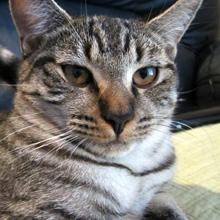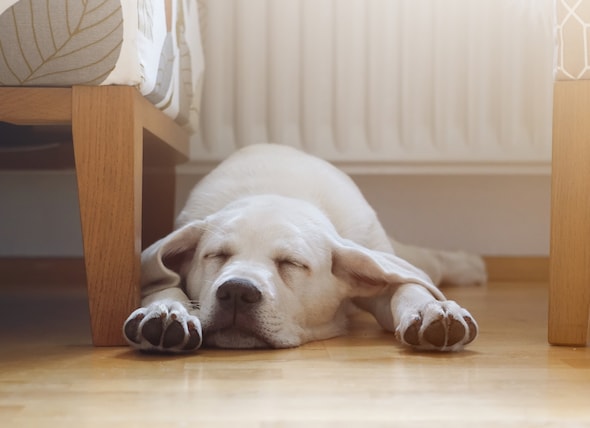
A Night To Celebrate!
Tips for Preparing Your Cat for Holiday Visitors
 |
|
With the holiday season upon us, our usually quiet household has become bustling with visitors. Our cats have to make some pretty serious adjustments, including dealing with new smells and faces, and giving up their room (aka the guest room) for our company. In order to make everything go as smoothly as possible, we’ve created a pre-holiday routine to help our cats deal with all of the changes in their world.
1. Optimize the litter-box situation
One of the most important (and often overlooked) aspects in a cat’s life is the litter box. It’s important that your cat has a clean box of adequate size, and that it’s placed somewhere the cat feels safe using it. We have a large guest bathroom that plays host to the litter box. This works great for everyday use, but company means significantly increased traffic in that room. Before our guests arrive, I put another one in a room that won’t be used. Our cats still have access to their usual box, but the extra litter box offers a quiet, private place to handle their business when they’ve had enough people time.
2. Establish a safe room for the cats
It’s important to have an area that your cats can always go to take a break from all the holiday bustle. We move a favorite cat tree into such a room, along with some toys, a litter box, and a bowl of fresh water. We also open the blinds so the cats can enjoy lounging in the natural light. Because we live in a pretty warm climate, we’re also able to open the windows to let in fresh air for them to enjoy. I think this helps our cats come out feeling more confident than if their only option of retreat was under a bed or another piece of furniture.
3. Protect against runaways
Both of our cats are very curious about the outdoors, but Odin is a Class A door-darter. With all of the in-and-out traffic that comes with visitors, it’s super important to make sure the cats remain safely inside. We typically put them in their safe room while our visitors are bringing in luggage, for example. Once everyone has settled in, we let the cats back out with a few basic instructions to our visitors, including being aware of the cats’ presence when opening outside doors and not leaving the doors open.
4. Give your cats adequate attention
Cats have feelings, too, and they certainly don’t want to feel left out of all of the fun. If your company enjoys cats, that’s a bonus! Your cats will love getting the extra attention — I know mine do. If your guests aren’t fans of the feline, make sure you set aside some time to play with your cats. This keeps them active and happy, and it can make future visits easier to handle.
5 Tips to Prepare Your Dog for the Holidays
 |
|
It’s that time of the year when schedules are thrown out the window, events fill the calendar, and friends and family gather at your home. The holidays are said to be the most wonderful time of the year, but our pups may not feel the same. They are used to a certain schedule and certain people and while it may not seem like a drastic change to you, your dog could be feeling very anxious during the holidays.
1. Give them plenty of exercise
Even if it’s a winter wonderland outside, a brisk walk can help your dog drastically. If you have a holiday event that evening where you know you’ll be gone longer than usual, take your pup for a slightly longer walk. A tired dog is a less-stressed dog!
2. Plan ahead with travel
If your holiday festivities include traveling with your party-pup, make sure the car ride is comfortable for them. Driving in the car may give your dog some anxiety, so bring their favorite toys, treats, and other essentials when packing up for a holiday road trip.
3. Create a comfy, safe space
If you are the hostess for your holiday parties this year, don’t forget to keep your dog as happy as your guests. Creating a space in a room further away from the loud noises could help them feel more comfortable – don’t forget to include their favorite toys.
4. Look into a pet sitter
Pets are like our children and we wouldn’t leave our children home alone without a sitter, so try doing the same for your dog! A professional pet sitter can keep an eye on your dog and help them feel less anxious while you are gone. Do research and make sure your sitter is a qualified pet care provider.
5. Try supplements for stress
Speak to your veterinarian about the available products that may be suitable for your pet. Plan ahead, and you may find a dog a calming supplement like Calming Care can help to alleviate stress and support calm behavior.
4 Sleep Disorders in Dogs
 |
|
Sleep can be lacking around the holidays, but sometimes there’s more to it than meets the eye. The average adult dog sleeps about 12 to 14 hours a day through a combination of daytime naps and nighttime sleep. Just like in people, sleep is key to a dog’s overall health. It also helps a dog feel more rested and energetic.
Dogs with sleep disorders might whine, cry, or frequently wake up during the night, become more sluggish during the day or seem more disoriented when performing normal tasks. Because sleep deprivation can cause a buildup of stress hormones, dogs with sleep disorders may also become more aggressive or develop other behavioral problems. In addition, a lack of sleep can weaken a dog’s immune system, increasing the risk of infection.
Here are four common types of sleep disorders that can occur in dogs and how to treat them:
If you notice any change in your dog’s normal sleeping habits, take your dog to your veterinarian as soon as possible. Do not try to diagnose or manage the sleeping disorder on your own, as this could prolong your dog’s poor sleep quality.
During the appointment, your veterinarian will first perform a physical exam then conduct other tests as needed to diagnose your dog’s sleeping disorder. Once the disorder is properly diagnosed, work with your veterinarian to come up with a treatment plan that will effectively manage the disorder and help your dog get better sleep.
Holiday Health Hazards
 |
|
The holiday season brings excitement and commotion associated with shopping, final exams, travel, and other seasonal preparations. In all the activities of the season our beloved pets may be exposed to hazards less commonly found other times of the year. As homes fill with holiday spirit, pets may be intrigued by the new sites, smells and tastes. The following are some of the most common health concerns for your pet during the holidays. If you have specific questions regarding any pet health concern please contact your veterinarian.
Tinsel, Ribbon and other Pretty Things
Ribbons, wrapping paper, ornaments, tinsel, extension cords and gifts may be appealing “chew toys” that may make your pet sick.
There is something about those shiny strands of Christmas tree decor, which drives kitties wild. Although the sight of your cat pawing at the tree may be cute, the ingestion of tinsel can be deadly. Eating tinsel or other string-like items such as ribbon (often called linear foreign bodies) can cause serious damage to the intestine. One end can get stuck while the rest is pulled into the intestine as it contracts; the contractions may cause the ribbon or tinsel to saw through the intestine. If not caught in time, infection of the belly cavity develops and the prognosis for recovery becomes poor. Pets with linear foreign bodies quickly become ill with signs including vomiting, diarrhea, depression, belly pain and sometimes fever.
Eating other holiday decorations can cause signs ranging from mild depression to severe vomiting or diarrhea, depending upon whether or not the foreign matter can be passed in the stool or gets stuck along the way. Foreign matter stuck in the intestine often does NOT show up on “x-ray” but sometimes the foreign matter will trap air in the intestine, which helps your veterinarian make a diagnosis. Surgery is required to remove foreign matter that does not pass out on its own.
Holiday Lights
Decorative lights are another attraction for pets to chew on. Both indoor and outdoor lights should be carefully examined to ensure safety for your household pets. Electrical shock may occur from defective cords as well as from pets chewing on cords. Check cords for any signs of bite marks, loose or frayed wires, proximity to the tree’s water supply or evidence of short circuits. Use grounded “3-prong” extension cords and strictly follow manufacturer’s guidelines for light usage.
Electrical shock can cause burns, difficulty breathing, abnormal heart rhythm, loss of consciousness, and death. Call a veterinarian immediately if your pet has been injured by electrical shock. Treatment will be most effective if begun soon after the shock.
Water, Water…
Even though they have their own water bowel, there is something enticing about a novel source of water; whether it’s the toilet bowl or the Christmas tree stand. If you add chemicals to the water meant to keep your tree fresh longer, be sure to read the label to make sure it is safe for pets.
Potpourri makes your house smell festive but may be another attraction for pets to drink. Make sure that potpourri pots are covered or otherwise inaccessible to pets.
It may be difficult to curb your pet’s fascination with all those pretty decorations. Child gates can be used across doorways to keep your pet away from the Christmas tree and decorations at times they cannot be watched.
Overindulgence
Well-intentioned family and friends may share holiday foods with pets causing the pet to develop a stomach upset or worse, pancreatitis (inflammation of the pancreas) which can be caused by eating fatty foods. To control excessive food intake by your pets and meet your guests’ desires to feed the pets, dole out the treats your pets would normally receive and let your guests “treat” the pets. If you want to get festive, mix some of your pet’s regular food with water to make a “dough” and roll out and cut into festive shapes, then bake until crunchy.
Extra attention from visiting relatives and friends may be relished by some pets while others seek solitude in their favorite hiding spot. Make sure pets are given some “personal space” if they want to get away from the commotion.
Some pets may respond to all the hullabaloo with a change in behavior including bad behaviors like eliminating in the house. Try to spend a little extra “quality time” with your pet to assure them they have not been forgotten.
Chocolate
What would the holidays be without boxes of chocolate and warm cocoa in front of the fire? However, chocolate can be toxic or even fatal to dogs and cats. Chocolate may be mistakenly given to pets as treats and may be irresistible to the curious canine. Chocolate poisoning occurs most frequently in dogs but other species are also susceptible. Theobromine is the toxic compound found in chocolate. Signs which may appear within 1 to 4 hours of eating chocolate include:
- Vomiting
- Increased thirst
- Diarrhea
- Weakness
- Difficulty keeping balance
- Hyperexcitability
- Muscle spasms, seizures, coma
- Death from abnormal heart rhythm
The toxicity of chocolate depends on the amount and type of chocolate ingested. The amount of theobromine in white chocolate or chocolate flavored dog treats is usually negligible. As with any poisoning, call your veterinarian or an emergency veterinary hospital immediately if you suspect your pet may have ingested chocolate. Have the product label information available when you call your veterinarian. There are national and regional poison control hotlines for animals. In general, the treatment of poisonings is most effective if begun soon after eating the poison, before large amounts are absorbed into the blood.
Poinsettias & Mistletoe
Poinsettias fill homes with color during the holidays. Poinsettias have received bad publicity in the past whereas in fact, poinsettias are not very toxic to pets. They do contain a milky sap that can irritate the mouth but if signs develop they are usually mild.
Mistletoe can be very toxic to animals and you should seek veterinary consultation immediately if your pet has potentially ingested any part of the plant. Mistletoe can cause vomiting, severe diarrhea, difficult breathing, shock and death within hours of ingestion.
There are many species of Holly (genus Ilex) Berries and leaves can be a problem although signs of poisonings are generally mild, and include vomiting, belly pain, and diarrhea.
Pets as Gifts
A cute, cuddly puppy or kitten may seem to be the perfect gift but unfortunately after the holiday season the population of animal shelters explodes with these “surprise gifts”. Owning a pet is a long-term commitment that not every one can make.
Dealing With Death or Severe Illness over the Holidays
The holiday season heightens our emotions and can be a very difficult time to deal with the loss or illness of a companion animal. The bond between animals and humans is often very strong and losses can be very painful. If you or someone you know needs support without judgment from those who appreciate your feelings and may be able to help, please contact the WSU College of Veterinary Medicine Pet Loss Hotline.
